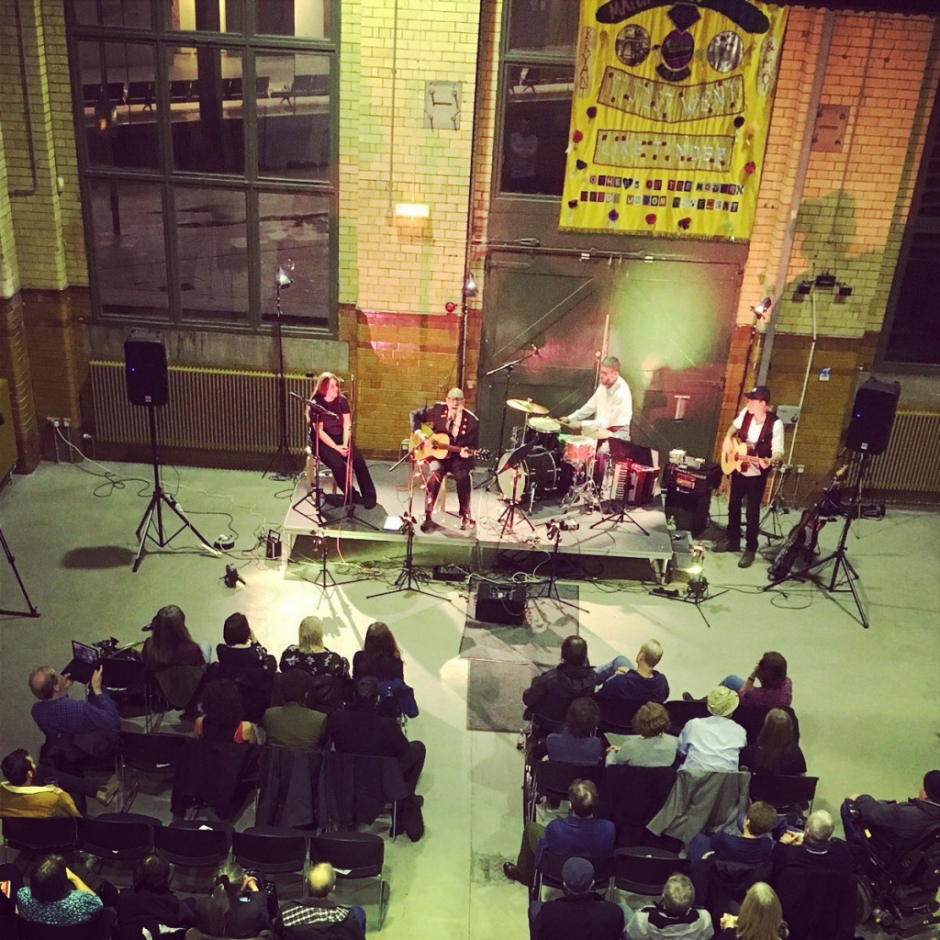Late afternoon on the last day of the inaugural Manchester Folk Festival, and we were with Quiet Loner at the International Anthony Burgess Foundation. One look at the instruments waiting on the stage, from the slide guitar to the banjo, via the acoustic guitars and the accordion, and you might imagine you were at a bog standard folk show. But a glance around the room would indicate that this wasn’t the case. Posters spoke of the ‘Right to Vote’. A presentation was waiting on the PowerPoint behind the stage, the words ‘The Battle for the Ballot’ emblazoned across it. And a bald man in a suit walked around the room, badges with political slogans on them placed prominently on his lapel.
This man turned out to be the ‘Quiet Loner’ himself, and in the following hour or so he was to take the crowd through the history of how the right to vote was won; first by a small percentage of men and then, gradually, over more than a century, by all men, then some women, and eventually to universal suffrage. As much a history lesson as a gig, as much a lecture as a performance, this was a very interesting way of bringing an important and sometimes ignored part of our past to the stage.
Aptly, as the heavens opened outside and people came in shaking themselves dry and shivering on their way to buy themselves a coffee or a cup of tea, the opening song was called “Manchester Rain”. Setting the scene for the coming songs, this track attempted to explain why voting rights were becoming such a hot topic in the early 1800s. While there were much better songs to come later in the performance, Quiet Loner Matt Hill set the scene well and drew the watching crowd in.
More powerful moments were delivered by “Banners Held High” and “The Dust of St Peter’s Field”, a double header which presented the promise of protest before it was torn away by the infamous events of the Peterloo Massacre. Choosing to represent this atrocity in his angriest and darkest song, rather than the weepy ballad many may have opted for, was a wise decision, and with the second of this double header Matt Hill turned this from an interesting and informative show to something much more affecting.
Hannah – a song about suffragist Hannah Mitchell, who grew up in the Midlands watching her brother go to school while she had to stay on the farm – was another highlight. The female singer who had accompanied Hill throughout the set took centre stage for the first time, and added an extra layer of emotion to proceedings with her more wistful and gentle vocal stylings. But the best was saved for last, with Election Day (1929). Here, Hill tells the story of an aging man taking his grandchildren to vote in the first election since voting rights were granted to all. Looking back at family who died in the Peterloo Massacre, and a wife who fought alongside the Suffragettes, Hill’s alter-ego reminds his grandchildren of the ‘people who died for that cross, and your right to put it there’. It is a surprisingly powerful image, and one which must have brought a tear to the eye of at least a few of the people watching.
Originally commissioned while Hill was the songwriter in residence at The People’s History Museum, this performance showed that the work can be just as effective away from the artefacts that inspired it. Hill pointed out, at different points in his set, that the battle for voting rights was not on school curriculums and that a third of all eligible people neglected to vote in this year’s general election. Maybe there is a connection there. Maybe if more people knew how hard the fight for voting rights was, they’d make more of an effort to walk around the corner and put their cross in a box. Maybe shows like this one by Quiet Loner are another way to make that happen.

